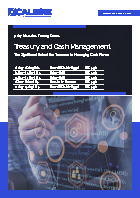| Date | Venue | Fee | |
|---|---|---|---|
| 10 Aug - 14 Aug 2026 | Sharm El Sheikh - Egypt | $ 5,950 | Register Now |
| 23 Nov - 27 Nov 2026 | Dubai – UAE | $ 5,950 | Register Now |
About the Course
Understanding, interpreting, and managing the cash flow is essential. Any business needs effective strategies to ensure enough liquidity to allow payments and avoid operation disruptions. Lack of liquidity might lead to insolvency even for profitable businesses. Techniques, financial instruments, and funding alternatives are at the edge of the financial strategies. The full scope of treasury and cash management for the business is the foundation for a valid sustainability strategy to ensure growth and allow business going concern. This is a vital aspect of theory and practical methods and techniques.
Treasury and cash management fall under the more extensive finance umbrella. They focus on multiple steps, including thoughtful financial and credit risk understanding and analyses. However, the knowledge of new treasury management models is limited and sometimes not aligned within the fast-evolving financial services landscape. Keeping up with the constant monitoring of cash (and treasury in general) is challenging as it should be adapted to different types of businesses and conditions; its methods are also applicable to single projects. Understanding and practising comparative analyses of varying cash flow structures across many industries will allow the delegates to better consider best practices, risks, and alternative options.
This 5-day interactive Treasury and Cash Management training course focuses on modelling strategies with unique approaches based on case studies and applications. Practical exercises will be performed during the training, and the delegates will be able to master the understanding of treasury and cash management.
Core Objectives
The delegates will achieve the following objectives:
- Understand the importance of treasury and cash management
- Apply cash flow strategies and evaluate the cash flow mix (operating, investing, financing)
- Assess the viability of different treasury management approaches
- Enhance decision-making skills through the experience and lessons learned from relevant case studies
Training Approach
The blended methodology includes the delivery of lectures based on the essential theory rooted in treasury and cash flow management. Practical examples (updated case studies) will also be provided and integrated with real-time brainstorming sessions. The delegates will be provided PDFs of relevant Books and scholarly articles, worksheets, and strategic techniques.
The delegates will have the knowledge and skills to perform their tasks successfully. This training course adopts strategies and methodologies suitable for upskilling and reskilling. Consistent and logical steps are followed to ensure complete understanding and application of the intended topics. All studied topics are carefully selected to ensure they help improve the organisations.
The Attendees
Likewise, it will be valuable to the professionals but not limited to the following:
- CEOs
- CFOs
- Business Professionals
- Financial Advisors
- Business Managers
- Clerks and Specialists who wish to advance their career
- Whoever works closely with Finance, Cash Flows, and Treasury
Daily Discussion
DAY ONE: CORPORATE TREASURY NOWADAYS
- The Importance of Cash and Treasury Management
- Trends in Cash and Liquidity Management
- Managing Cash as a Global Process
- Information Systems and Treasury Management
- Treasury Models: Active or Passive
DAY TWO: RISK MANAGEMENT AND THE ROLE OF THE TREASURER
- Who is the Treasurer?
- Treasurer vs. CFO
- Assessing Financial and Credit Risk
- Preparing the Right Treasury Policy
- Hedging Accounting and Finance
- Risk Models (VAR)
- Designing and Applying Risk Management Frameworks
DAY THREE: TREASURY MANAGEMENT IN PRACTICE
- Cash Flow Statement Preparation
- Ratio Analysis vs. Flows Analysis: Accrual vs. Cash Basis
- Capital Asset Pricing Model
- Levered vs. Unlevered
- Cost of Equity
- Weighted Average Cost of Capital (WACC)
- Tax Shield
DAY FOUR: FINANCIAL ANALYSES
- IFRS vs. US GAAPs
- Sources of Financial and Non Financial information
- Capital Market Functions
- Primary vs. Secondary markets
- Debt Instruments: Bonds, Loans, Derivatives
DAY FIVE: CASH MANAGEMENT
- What factors can affect cash flow?
- The Core Ratios
- Profitability Ratios
- What ratios measure operating efficiency?
- What ratios can help with financial structure?
- Is growth sustainable?
- What are the market ratios?
- Error Functions and Units
- What checks are required?
Certificate Awarded
Upon successful completion of this training course, participants will be awarded a Certificate of Completion from XCalibre Training Centre, acknowledging their accomplishment. This certificate serves as a testament to their dedication to developing their skills and advancing their expertise in their respective fields.



